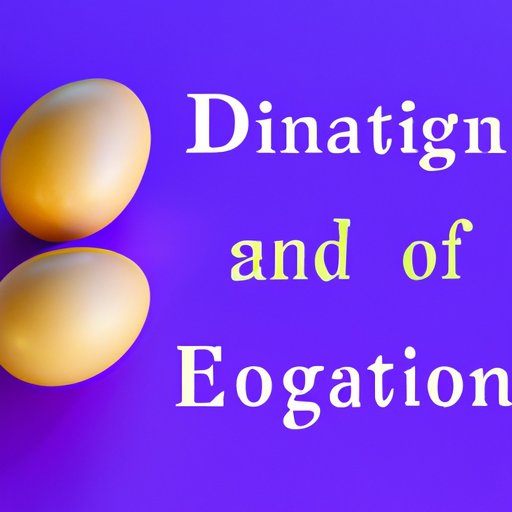Introduction
If you are struggling with infertility, you are not alone. According to the Centers for Disease Control and Prevention (CDC), about 6.1 million women in the United States have difficulty getting pregnant or staying pregnant. Fortunately, there are several fertility treatments available, including egg donation, which can help individuals and couples realize their dream of having a child. In this article, we will explore the process of egg donation, including its physical, emotional, and ethical aspects, as well as its impact on children and families.
Explaining the Basics of Egg Donation
Egg donation is a fertility treatment in which a woman donates her eggs to another woman, or a couple, who is unable to conceive on their own. To be an egg donor, a woman must meet certain requirements, including being between the ages of 21 and 34, being in good physical and mental health, having regular menstrual cycles, and not having a history of certain medical conditions or genetic disorders. Egg donors may be anonymous or known, depending on the preferences of the recipients.
The egg donation process typically begins with a consultation with a fertility specialist. The donor will then undergo a series of medical and psychological tests to ensure that she is a suitable candidate for egg donation. This may include a physical exam, blood tests, genetic testing, and a mental health evaluation.
If the donor is approved, she will undergo a process known as ovarian stimulation, which involves taking hormones to stimulate her ovaries to produce multiple eggs. During this time, the donor will need to undergo regular monitoring, including blood tests and ultrasounds, to check her hormone levels and the development of her eggs.
Once the eggs are mature, the donor will undergo an egg retrieval procedure, which is typically done on an outpatient basis under sedation. During the procedure, a doctor will use a needle to extract the eggs from the donor’s ovaries. The entire process typically takes about 30 minutes to an hour.
The Emotional and Physical Aspects of Egg Donation
While egg donation can be a rewarding experience, it can also be emotionally and physically challenging for the donor. The process of ovarian stimulation can cause side effects such as bloating, mood swings, and headaches. The egg retrieval procedure itself can also cause discomfort and cramping.
In addition to the physical challenges, egg donation can also be emotionally difficult for some donors. The decision to donate eggs is a personal one, and donors may have concerns about the implications of their donation. Donors may also experience feelings of loss or grief, particularly if they have created embryos that are not used.
It is important for egg donors to receive appropriate support and care throughout the process. This may include counseling or therapy, as well as access to support groups or resources.
The Medical Side of Egg Donation
While egg donation is generally considered safe, there are risks and complications associated with the process. These include ovarian hyperstimulation syndrome (OHSS), a condition in which the ovaries become swollen and painful, as well as infection, bleeding, and damage to nearby organs.
It is important for donors to be fully informed of these risks and to undergo appropriate medical screening before undergoing the egg donation process. This may include screening for infectious diseases such as HIV and hepatitis, as well as genetic screening to identify any potential risks to offspring.
The Importance of Egg Donation for Infertility
Egg donation can be an effective fertility treatment option for individuals and couples who are unable to conceive on their own. This may include women who have premature ovarian failure, early menopause, or certain genetic conditions. Egg donation may also be used in cases where traditional fertility treatments such as in vitro fertilization (IVF) have been unsuccessful.
Compared to other fertility treatments, egg donation offers a higher chance of success for some couples. According to the American Society for Reproductive Medicine (ASRM), the success rate for egg donation is typically around 50-60%, compared to around 10-20% for traditional IVF.
Legal and Ethical Considerations of Egg Donation
Egg donation raises a number of legal and ethical issues, including questions of informed consent, financial compensation for donors, and ownership of biological material. It is important for donors and recipients to be fully informed of their rights and responsibilities before entering into an egg donation arrangement.
One of the most significant ethical issues surrounding egg donation is that of financial compensation. While donors are typically compensated for their time, inconvenience, and expenses related to the donation process, there is debate over whether donors should be paid for their eggs themselves. Some argue that paying donors amounts to exploitation or commodification of the body, while others argue that donors should be fairly compensated for the risks and inconvenience they undertake.
Similarly, there are questions regarding ownership of biological material, particularly in cases where donors have created embryos that are not used in the immediate fertility treatment. It is important for donors and recipients to have a clear understanding of the legal implications of their donation, including ownership of genetic material and potential parental rights.

The Impact of Egg Donation on Children and Families
Families created through egg donation may face unique ethical and social implications. For example, children born through egg donation may have questions about their genetic heritage or their relationship to their donor. Similarly, parents may have concerns about how to talk to their children about their origins or how to incorporate the donor into their family life.
It is important for families created through egg donation to engage in open communication and to establish clear boundaries and expectations early on. This may include discussing disclosure with children, creating a plan for maintaining contact with donors or donor siblings, and seeking counseling or support as needed.
The Future of Egg Donation
As technology continues to advance, the field of egg donation is likely to see further developments. One area of current interest is that of egg freezing, which may allow women to preserve their fertility for later use. Similarly, advancements in genetic screening may help to reduce the risk of genetic disorders in offspring.
It is important for individuals and couples considering egg donation to stay informed of the latest developments in the field and to work with a reputable fertility specialist who can provide appropriate care and guidance.
Conclusion
Egg donation can be a valuable fertility treatment option for individuals and couples struggling with infertility. However, it is important for donors and recipients to fully understand the physical, emotional, and ethical aspects of the process. By working with an experienced fertility specialist and seeking appropriate support and care, individuals and couples can make informed decisions about their family creation and work towards the realization of their dreams of parenthood.
(Note: Is this article not meeting your expectations? Do you have knowledge or insights to share? Unlock new opportunities and expand your reach by joining our authors team. Click Registration to join us and share your expertise with our readers.)
